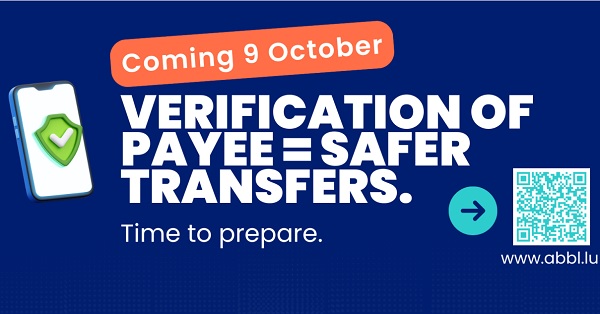
On Friday 11 July 2025, the Luxembourg Bankers' Association (ABBL) announced the upcoming implementation of the Verification of Payee (VoP) system.
In response to the increase in fraud attempts, Luxembourg banks are strengthening the security of transfers by implementing the VoP system from Thursday 9 October 2025.
In its statement, the ABBL highlighted the "significant progress" attained by this mechanism, while calling on users, both professional and institutional, to take a number of initiatives now to facilitate its adoption and to optimise its operation.
The ABBL noted that there has been a significant increase in attempted transfer fraud, affecting both individuals and businesses, in recent years. This trend can be explained by several factors: the professionalisation of criminal networks, the intensive use of digital tools that facilitate identity theft (voice deepfakes, email spoofing, targeted phishing) and the proliferation of digital channels used in businesses (emails, payment platforms, supplier portals), all of which constitute potential entry points for fraudsters.
Fraudsters target human error in particular, using increasingly sophisticated methods such as fake suppliers, fake CEOs, invoice manipulation and social engineering scams. Although there are currently no consolidated figures available in Luxembourg due to the lack of a centralised database, the ABBL said the 20.8% increase in online scams reported by the Grand Ducal Police in 2024 illustrates the continued growth of this phenomenon, and the trends observed by various sectors are clear.
"The sharp increase in reports and feedback from the field show that this threat is now systemic and requires greater mobilisation of all players in the online fraud chain," emphasised Ananda Kautz, Member of the ABBL Management Committee.
"9 October 2025 will mark a new milestone in the fight against fraud and the security of payments within the European Union," she continued. On this date, the VoP service will become operational for euro transfers within the SEPA zone. "This technological advance, supported by the European Commission, aims to improve the reliability of transfers by automatically verifying that the beneficiary’s name matches their IBAN before a payment is executed. It will actively help to prevent identity theft fraud and data entry errors."
The ABBL said the implementation of the VoP represented a real technological challenge for its members, who had to thoroughly adapt their payment systems to enable real-time, large-scale verification. This commitment was accompanied by significant investments in infrastructure, interoperability and data security, reportedly illustrating the banking sector's desire to strengthen confidence in electronic payments while maintaining efficient execution times.
With the implementation of the VoP, users will receive a message similar to the following for each transfer:
- Match: the data matches - the transfer can be confirmed without modification;
- Close Match: partial match - a name suggestion is provided;
- No Match: the data does not match - an alert is displayed, prompting verification;
- Verification not possible: the verification service could not be performed for a technical reason, for example - the transfer can be processed, but with caution.
In the event of a "no match" or "close match", the user is free to validate the transfer but assumes full responsibility in the event of an error.
The ABBL also noted that Beneficiary Verification only applies to the creation of new standing orders and the modification of existing standing orders. Existing standing orders which are not modified are not affected.
To fully benefit from the advantages of the VoP and reduce the risk of failure or error, the ABBL is encouraging businesses and institutions to follow several recommendations.
As a payer:
- always use the exact name appearing on the beneficiary's bank account details (RIB). If this is not possible, use the name indicated next to the IBAN on the invoice or payment request. If in doubt, ask the beneficiary for the correct name to enter;
- update the list of registered beneficiaries with the exact names;
- if in doubt about a "no match" or "close match", contact the beneficiary directly via a secure and known channel.
As a beneficiary:
- provide customers with the exact name of the account (company name) as registered by your bank;
- add this name clearly next to the IBAN on invoices, purchase orders and other official documents;
- check and update commercial documents to avoid any ambiguity.
Ananda Kautz stated: "The implementation of the VoP is based on a simple principle: payment security is everyone's business. As a payer or beneficiary, everyone has an active role to play in ensuring the integrity of transactions and strengthening confidence in electronic transfers."
Companies and institutional customers making multiple transfers via files can, if they wish, deactivate the VoP ("opt-out") for these transactions. This is because, in the event of a "no match" or "close match" on just one of the transfers, all of the transfers contained in the file will be affected. To do so, they need to contact their customer advisor at their bank or payment service provider.
The ABBL has created a dedicated page where businesses and institutions can find more details.








